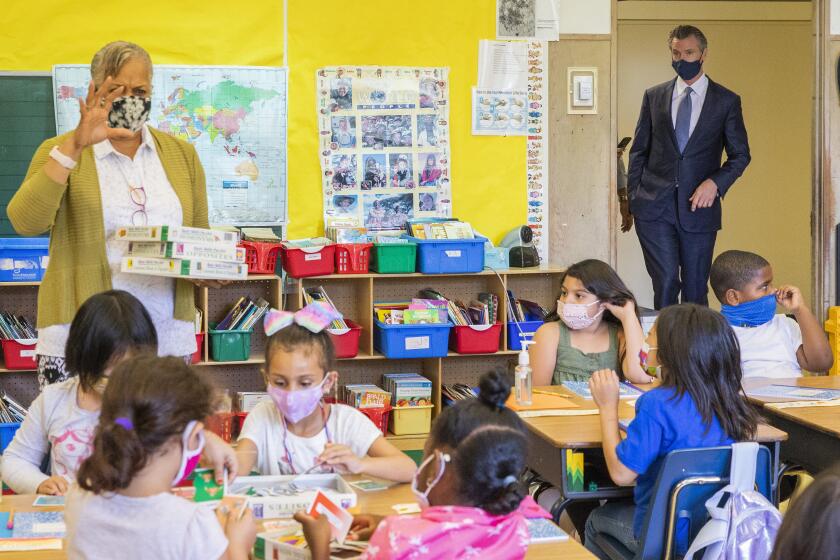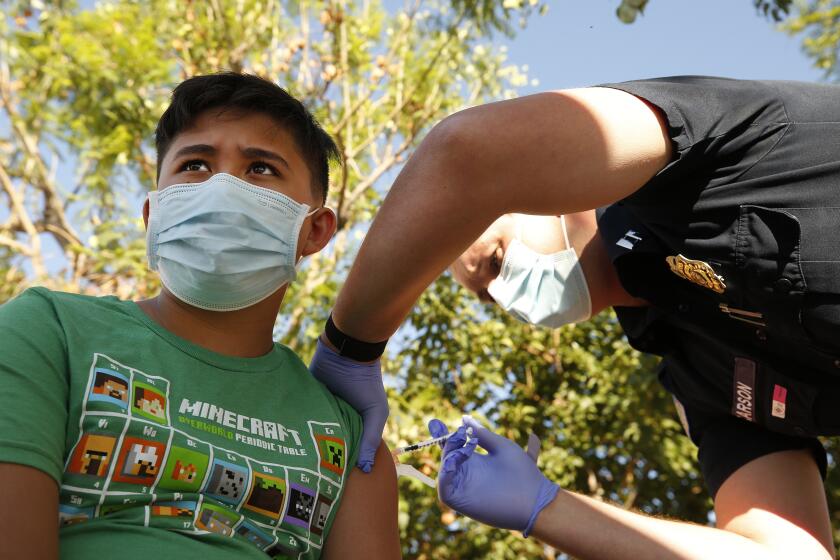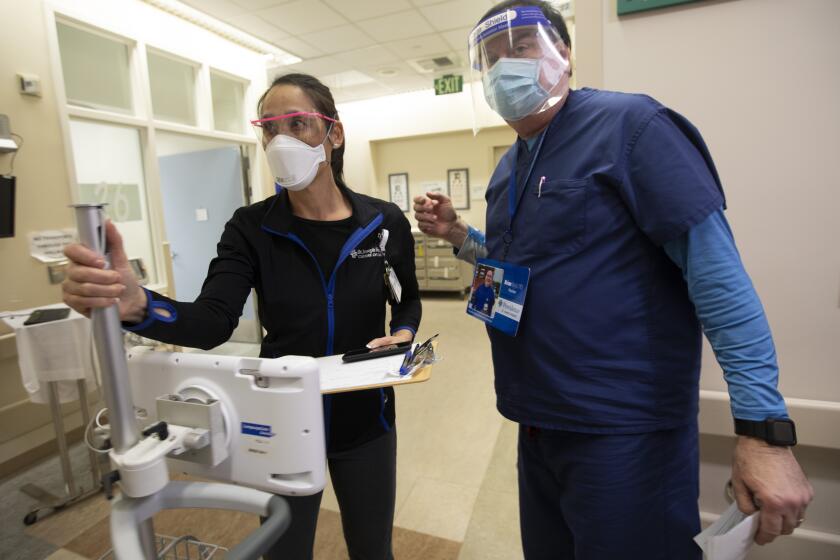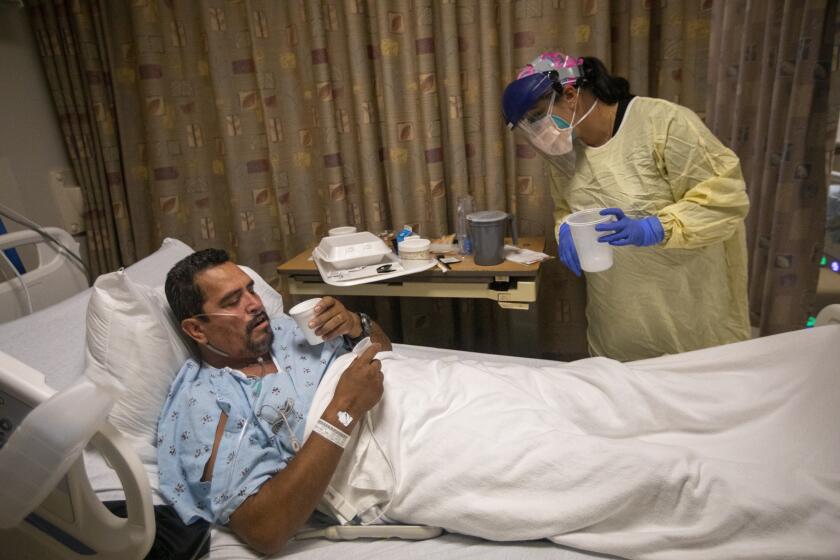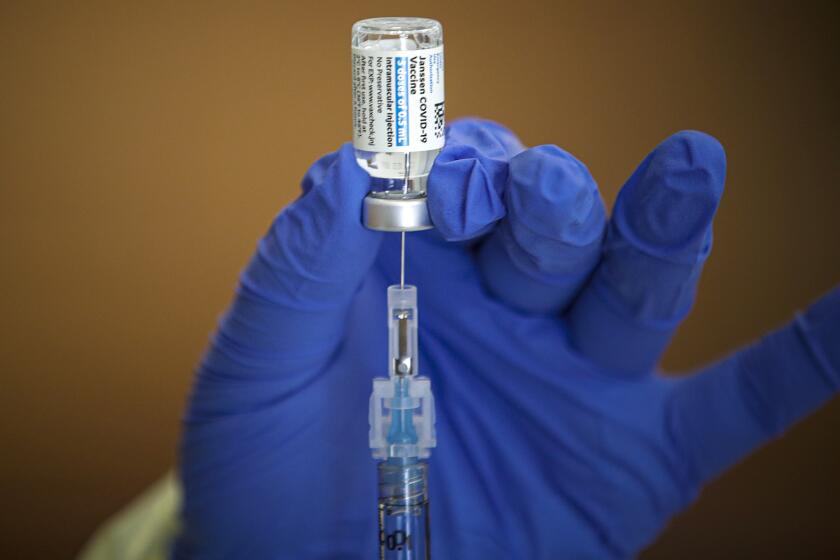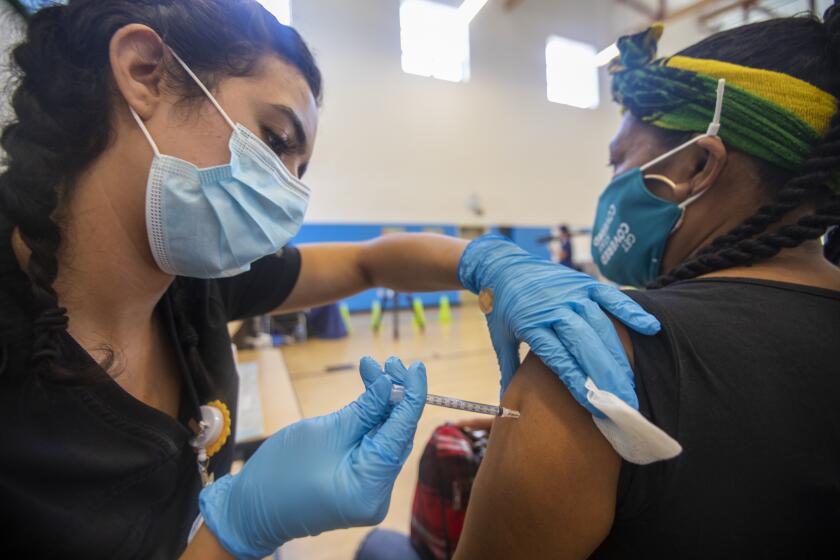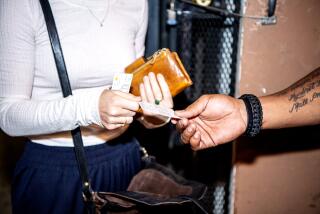L.A. moves toward vaccine requirement for indoor restaurants, stores, gyms, bars
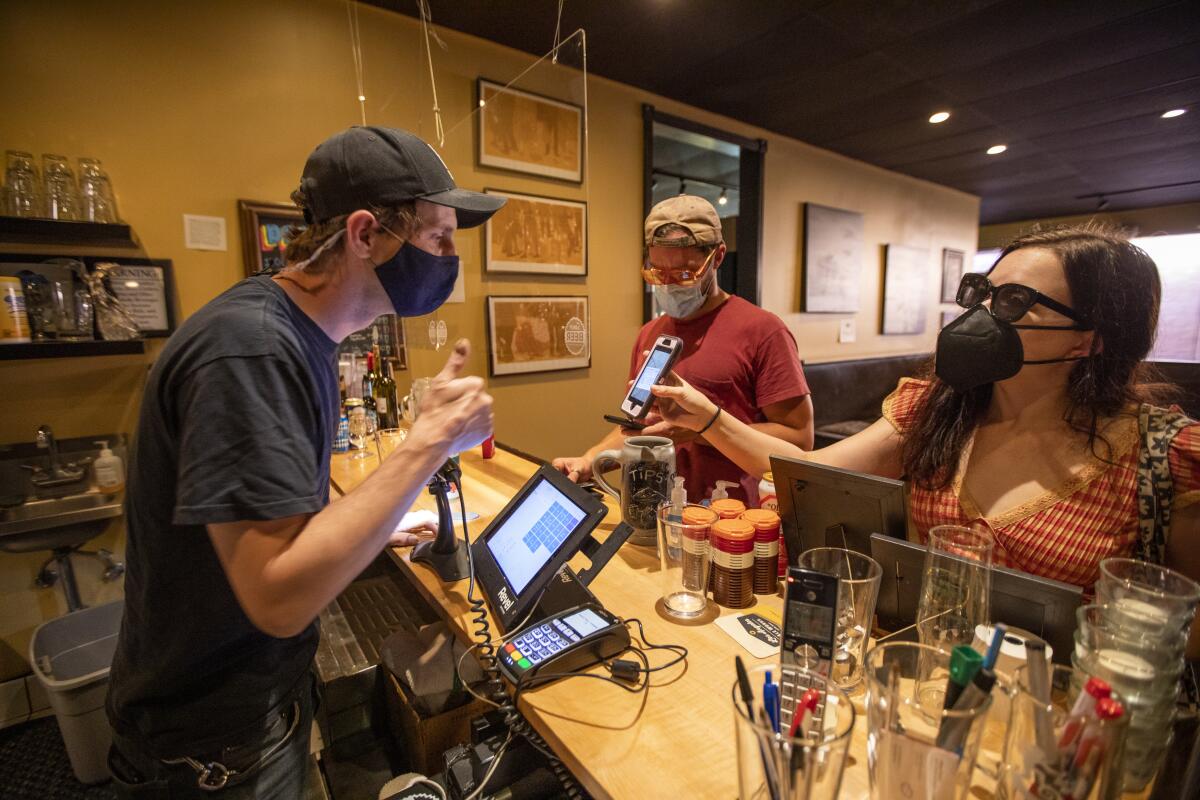
- Share via
Los Angeles officials took a step Wednesday toward requiring people to have at least one dose of a COVID-19 vaccine before venturing into indoor restaurants, bars, gyms, shops, movie theaters and other venues — a move they argued would combat the resurgent coronavirus.
The City Council voted to direct city attorneys to draft the law, though much of the plan remains to be worked out, including precisely where it would apply and how the new rules would be enforced. Once it is drafted, the proposed law would go back before the City Council for final approval.
L.A. previously announced that it will require city employees to either provide proof of vaccination or undergo weekly testing. It is not alone in considering such steps in hopes of blunting the latest COVID-19 wave.
California has ordered that healthcare workers statewide must be fully vaccinated against COVID-19 come early fall, with limited exemptions allowed for medical or religious reasons. State and school employees will have to show proof they’ve been vaccinated, with those who remain uninoculated subject to a regular testing regimen.
And in wider L.A. County, officials are requiring the county’s 110,000 employees to provide proof of vaccination by Oct. 1 and are also mulling over the possibility of instituting their own public vaccine verification rules.
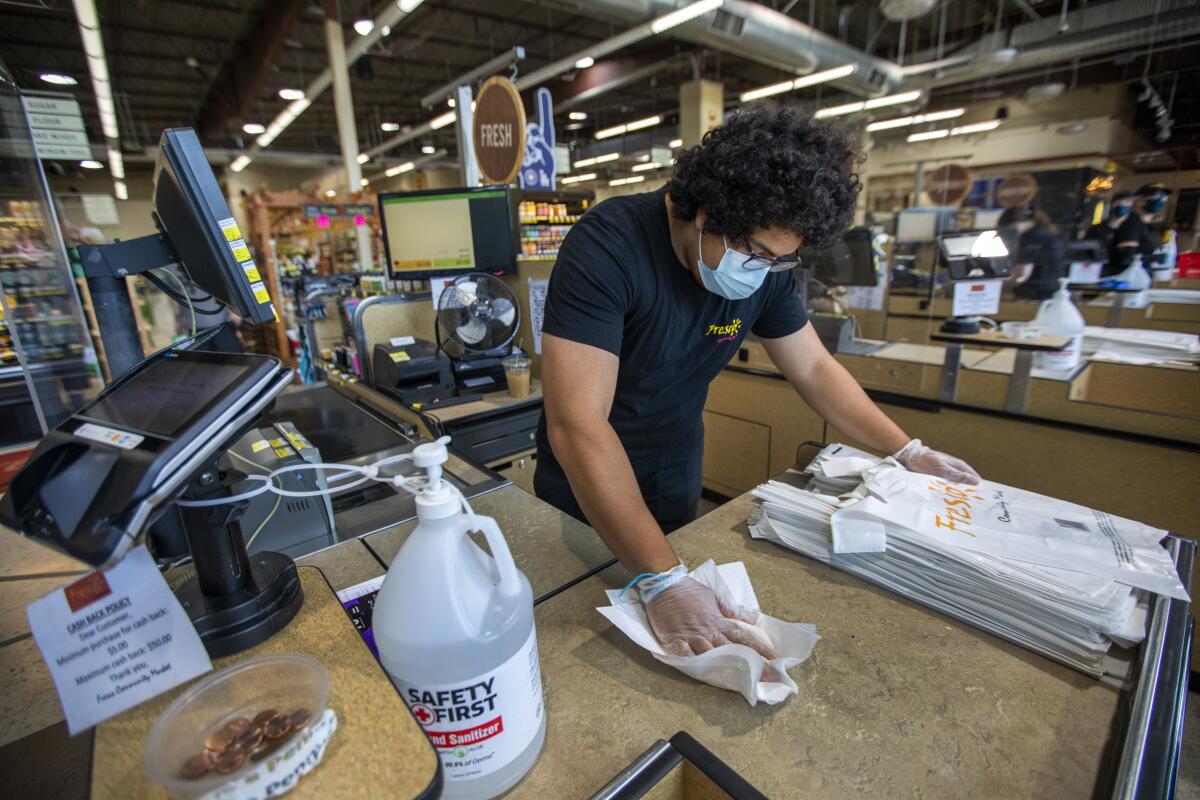
Collectively, the flurry of actions point to a new front in the long-running battle against COVID-19: one in which officials, after months of education, outreach and inducements aimed at getting more Californians to roll up their sleeves, are increasingly willing to insist on the shots to work and play.
“If we ever want to get back to normal, to what Los Angeles was like pre-COVID, we need to stop the spread in places most high risk,” said Council President Nury Martinez. “So, if individuals want to go to their gym, go to their local bar without a mask, you need to get vaccinated. And if you want to watch a basketball game, a baseball game, go to a concert at a big venue, or even go into a movie theater, you need to get a shot.”
Martinez and Councilman Mitch O’Farrell announced the city proposal last week, arguing it would protect people in public places as COVID-19 cases surged.
School employees must either be vaccinated against COVID-19 or submit to a regular test proving they are not infected with the coronavirus under an order from Newsom.
O’Farrell said it was “not a vaccine mandate” because no one would be forced to get vaccinated or denied “the ability to access essentials” such as food.
“That wouldn’t be legal, that wouldn’t be moral,” he said. “But what is immoral is choosing not to get vaccinated, choosing to listen to some delusional rant on Twitter.”
As part of their 13-0 vote, council members directed city staff to gather input from businesses on what specific types of public spaces should be included in the ordinance, and also to meet with parents, teachers, pediatricians and child-care providers to discuss how best to protect children under the age of 12, who remain ineligible to receive the vaccine.
COVID-19 hospitalizations have essentially doubled across much of California over the past two weeks — a troubling trend officials say illustrates the pandemic’s continued potency amid an ongoing surge in infections.
Business and restaurant industry groups have shown openness to the idea.
Jot Condie, president and chief executive of the California Restaurant Assn., said in a statement that “if asking patrons for proof of vaccination in indoor public spaces can help us all avoid more shutdowns, massive layoffs, and operating limits, then we will do everything we reasonably can to assist” the effort.
United Food and Commercial Workers Local 770, which represents more than 30,000 workers, including grocery store employees, welcomed the measure, saying its members had endured high rates of COVID-19 infection and other threats.
It urged the city to make sure the ordinance included a trained “health and safety officer” for each retail site.
“It is impossible for retail workers to maintain the store inside and enforce the vaccine requirement outside,” union President John M. Grant wrote in a letter to council members.
The rate at which coronavirus tests are coming back positive has fallen in the last week in Los Angeles County but is expected to rise further in Orange County.
Some opponents wrote to council members denouncing the plan as overreaching, including people who dismissed the COVID-19 pandemic as a hoax or who argued that the vaccines were harmful. Many raised concerns about the emergency authorization for the shots or argued that so-called breakthrough infections in people who have been inoculated undermined the case for vaccines.
“What you are proposing is just a way to punish people who aren’t vaccinated,” one letter writer argued. “This is absolutely unscientific and unnecessary.”
Residents who called into Wednesday’s council meeting were largely opposed to the concept, with some saying they felt requiring vaccine verification was akin to segregation and would imperil the region’s economic recovery by eroding the customer base for some businesses.
Council members, though, said getting coronavirus transmission under control is the surest way to avoid the kind of stringent capacity or operational restrictions businesses and venues only recently escaped.
California’s coronavirus case rate remains significantly less than Florida and Texas: two common points of comparison given their population size and different pandemic responses.
In L.A. County, Public Health Director Barbara Ferrer said the chance of an unvaccinated person getting infected was four times greater than for someone who was fully vaccinated. And the risk of being hospitalized with COVID-19 was 19 times higher among those who were not fully vaccinated than it was for those who had their vaccinations.
“If you get vaccinated, you got a lot of protection,” Ferrer said Tuesday. “You’re highly unlikely to even get infected. If you do get infected, very few people end up in the hospital, and very, very few people end up passing away.”
Health officials say they’re largely unnecessary and the primary focus should be getting the unvaccinated to roll up their sleeves.
Given the protection afforded by the vaccines, public health experts say getting more residents to roll up their sleeves is the best way not only to thwart California’s current surge but also to armor the state against future coronavirus resurgences.
Roughly 63% of L.A. County residents have already gotten at least one dose, and 55% are fully vaccinated, according to data compiled by The Times.
But even that relatively robust level of vaccine coverage means millions of residents remain uninoculated — including all children under 12, who are not yet eligible for the shots.
The statewide vaccination campaign has only taken on new urgency after the arrival of the Delta variant, which is believed to be the most transmissible version of the coronavirus yet. California has seen an uptick in dose administration over the last few weeks as coronavirus transmission again picks up steam.
The increase comes as a growing list of municipalities, businesses and venues are moving to require the shots for employees and, in some cases, customers.
But with cases surging to levels not seen since the fall-and-winter wave, and hospitals once again contending with a crush of COVID-19 patients, political leaders have increasingly turned to more aggressive action.
“Los Angeles has a responsibility to protect Angelenos. And if we need to encourage people to get vaccinated by putting restrictions on leisure activity, then so be it,” Councilman Paul Koretz said.
Times staff writer Jaclyn Cosgrove contributed to this report.
More to Read
Sign up for Essential California
The most important California stories and recommendations in your inbox every morning.
You may occasionally receive promotional content from the Los Angeles Times.
